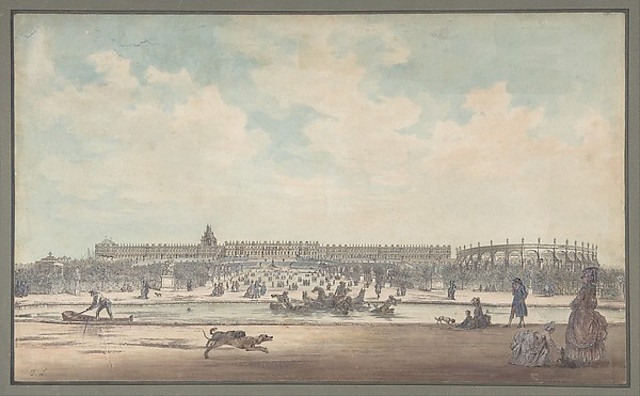Mme de Boigne (1781-1866), née Adèle d’Osmond, was a French salon hostess and writer. She was born in the Château de Versailles and lived at the court of Louis XVI and Marie-Antoinette until her family fled to England during the Revolution. Later in her long life, she married a rich soldier of fortune 30 years her senior, hosted a brilliant salon in Paris, and became an intimate of the last French queen, Marie-Amélie, consort of King Louis Philippe (r. 1830-1848). Childless herself, Mme de Boigne addressed her memoirs to her nephew. The memoirs were not published until 1907, under the title Récits d’une tante, or An Aunt’s Tales. They’ve never been published in English, as far as I know, so I’ve decided to translate the first 5 chapters, the ones that take place mainly at Versailles, and post them here on this blog for interested readers to enjoy for free.
The chapters are quite lengthy, so I’ve broken each one into several parts. In the first instalment (see below), Mme de Boigne breezily recounts her father’s family history down to the time that he met her mother.
A Versailles Childhood – Chapter 1, Part 1.1
Such great events occupied the the life of the generation that precedes you and absorbed so much of its attention that the family traditions would be lost if some old woman such as I did not revisit her childhood memories in order to write them down. I will endeavour to string a few together for your use, dear nephew.
Giannone, in his History of Naples, will instruct you in the most brilliant pretensions of your family, and Moréri will explain the rights that you have to believe yourself the descendant of those fortunate Norman adventurers who conquered Puglia, rights as well founded as are most of these family pretensions to antiquity. Salisbury Cathedral shelters the mortal remains of one of its archbishops, Saint Osmond, to whom we also attach ourselves. The coat of arms of the county of Somerset has its vol, or pair of wings, which are also part of your arms; they have theirs from their lord Osmond, the compatriot of William the Conqueror. These arms were given by the Duke of Normandy to his governor, Osmond, who had saved him from the vengeance of Louis d’Outremer.
The English branch was extinguished long ago, but its name has remained familiar and perpetually recurs in poems and novels. The Norman branch impoverished itself through equal inheritance. The eldest sons of the last three generations that preceded my father’s only had daughters, and in such great numbers that they made very poor marriages. Thus one of my great-aunts, the Canoness of Remiremont, when her sister’s husband asked if she ever regretted never having married, replied, “No, brother, the Osmond girls are in the habit of making such bad marriages!” This is all I will tell you about our family.
If, when the time comes that you go into the world, you attach some value to these noble memories, you will more easily find traces of these distant times than intimate details of what has happened in the last hundred or so years. In any case, I am not very good at these tales. I have never attached much value to the advantages of birth. They were never called into question when I was a girl, and then as a woman I had no right to them; perhaps this situation has prevented me altogether from occupying myself with them as much as many others do. Therefore, I only want to recount to you those details that come to mind from the memory of what I have personally heard or seen, without pretence of any great narrative, and only as anecdotes that will interest you by virtue of my relationships with the people in question. It will be a sort of gossip, the whole value of which will be in its sincerity.















